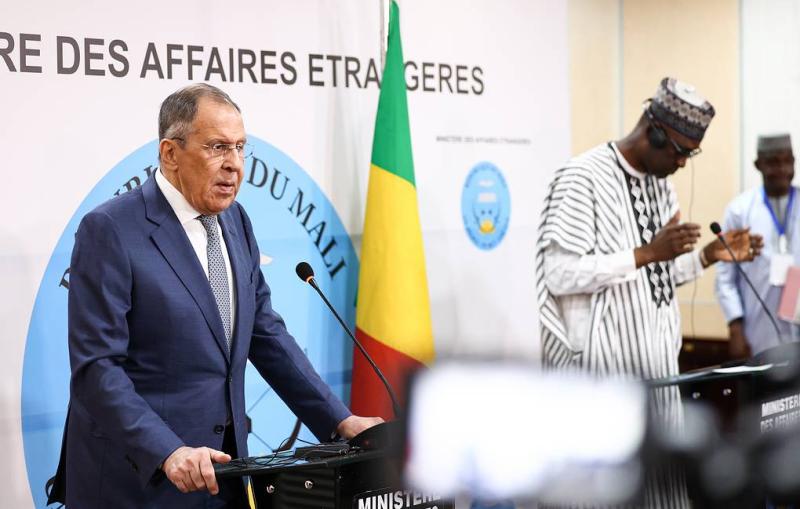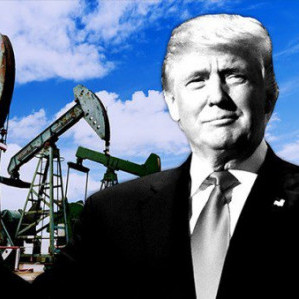
© Russian Foreign Ministry/TASS
Top stories from the Russian press on Wednesday, February 8th, prepared by TASS
Russia aims to expand its Sahel foothold despite sanctions, Turkey may experience earthquake aftershocks for another two weeks, and Zelensky is invited to the Brussels conference. These stories dominated the front pages of Russian newspapers on Wednesday.
Vedomosti: Russia seeks to expand its Sahel presence amid restrictions
For the second time this year, Russian Foreign Minister Sergey Lavrov visited Africa, where he arrived following a visit to Iraq. Lavrov arrived in Mali's capital, Bamako, on February 7, where he met with Mali's transitional president Colonel Assimi Goita and Foreign Minister Abdoulaye Diop. According to experts interviewed by Vedomosti, the nations of the Sahel could be key partners for Russia amid Western restrictions.
Per the Malian minister, Bamako opposes international economic sanctions against Russia in connection with the Ukrainian war. "The Malian army has greatly increased its combat capabilities in countering the terrorist threat," Lavrov said in Bamako, citing Russian assistance, including the provision of planes. Moscow also intends to improve military ties with Mali and boost Malian officer training at Russian military universities. The parties discussed expanding trade, economic, and investment ties, the development of mineral deposits, energy, and agriculture.
The Sahel states are rich in underdeveloped resources of rare earth metals, Research Fellow at the Russian Academy of Sciences' Institute of Oriental Studies Grigory Lukyanov told Vedomosti. They should not, however, be seen as a source of mineral goods or a market for Russia. Lines of communication must be developed with them first and foremost in order to create relations with other Central and West African countries.
Mali became Russia's foothold in the Sahel after its government started working with the Wagner Group, but the country lacks sea access, therefore it is necessary to build relations with other "entry points" to the region, like Mauritania, Algeria, and Morocco, the expert added.
Russia’s presence in West Africa is particularly interesting from the standpoint of transporting oil by sea in the face of access limitations to EU ports, Associate Professor at Moscow State University's Faculty of World Politics Natalia Piskunova noted. West African ports, where Russian oil can be refueled and reloaded, are critical. She believes Lavrov's trip is aimed at setting up a foundation for this, as well as specific technical solutions.
Izvestia: Aftershocks in Turkey may persist for two more weeks
The death toll continues to rise in Turkey and Syria after a series of massive earthquakes that began on the morning of February 6. Large-scale search activities are being carried out in the countries, while authorities from other nations have dispatched relief and rescue teams to the disaster zones. However, aftershocks are still being reported in the area. According to experts, a series of recurring earthquakes, the number of which has already surpassed 300, may last for another two weeks.
Around 3,200 specialists from 14 countries, including Russia, the United Kingdom, Germany, and France, are participating in search and rescue efforts at the disaster areas. Russian rescuers are focusing on the Kahramanmaras region, which was the hardest hit by the earthquake, according to adviser to the Minister of Emergency Situations Daniil Martynov.
The earthquakes had a catastrophic impact not only on Turkey, but also on a huge section of northeastern Syria. Syrian Arab Red Crescent President Khaled Hboubati even asked to lift the country's economic sanctions in order to assist the nation in dealing with the earthquake's aftermath. Despite the restrictions and the possibility of falling under US sanctions, Damascus has received help from the UAE, Algeria, Iran, Iraq, Russia, and a few other countries. Russian specialists from the Ministry of Emergency Situations arrived in the country and "immediately moved to the area of search and rescue operations," according to the ministry's press department.
Although the most intense earthquakes have passed, the possibility of further aftershocks remains, Director of the Institute of Earthquake Prediction Theory and Mathematical Geophysics Peter Shebalin told Izvestia.
"At our institute, we have an automated system for predicting activity after earthquakes of magnitude 6.5 and above around the world," he said. According to the expert, the number of aftershocks is already falling faster than the average after similar earthquakes. Thus, recurrent earthquakes of magnitude 6 and above can be expected to cease in two weeks.
Nezavisimaya Gazeta: Zelensky invited to Brussels summit
President of the European Council Charles Michel has officially invited Ukrainian President Vladimir Zelensky to the EU leaders' summit in Brussels on February 9-10 despite the fact that European Union officials spoke with him just the other day in Kiev. According to analysts interviewed by Nezavisimaya Gazeta, the trip may support the narrative of Ukraine's accession to the EU, although that may also depend on Israel's willingness to offer significant support to Kiev - specifically, Israeli Foreign Minister Eli Cohen's willingness to deliver more serious forms of assistance.
The meeting of the EU's 27 leaders in Brussels, which begins on Thursday, was expected to discuss Ukraine, migration, and reactions to the US law on inflation reduction. Meanwhile, Kiev media reported, citing the Financial Times, that security issues could interfere with the trip, particularly considering the possibility of a Russian offensive.
At the same time, experts believe Zelensky may travel to Brussels to avoid receiving the Israeli visitor and place additional pressure on the country’s leadership. Kiev reportedly requested that Israel implement a number of resolutions to support Ukraine ahead of the visit of the country’s Foreign Minister Eli Cohen to Ukraine, who also requested a meeting with Zelensky, according to Israeli media.
"We can see how Ukraine is attempting to obtain more serious support measures from the Israeli leadership. Whereas Israel's leadership is doing everything it can to avoid the very public act of giving Ukraine, say, missiles and Iron Dome air defense systems. Vladimir Zelensky may take such a step in order to put pressure on him," Deputy Director of the Institute for Strategic Studies and Predictions of the Peoples' Friendship University of Russia Nikita Danyuk told the newspaper.
The expert believes that Zelensky’s participation in the upcoming event will not change anything for Ukraine. The Kiev authorities' greatest wish - for Brussels to issue a public statement on the terms of Ukraine's accession to the EU - will not be fulfilled.
Kommersant: Nuclear powers discuss reducing global war risks
In the midst of the Ukraine conflict, Russia and the US froze bilateral discussions on strategic stability and arms control. However, the dialogue unexpectedly resumed and included three more official nuclear powers - China, the UK, and France, in addition to Russia and the US. On February 2-3, Dubai held a working meeting of delegates from the Nuclear Five countries' Ministries of Foreign Affairs. While the event is unlikely to have produced any groundbreaking results, experts believe its relevance should not be ignored, Kommersant writes.
The two-day meetings in Dubai were not made public. On the condition of anonymity, Kommersant sources close to the diplomatic departments of the Five nuclear-weapon states confirmed the meeting in Dubai but did not reveal any details. However, in a statement issued following the Paris Conference, the five countries vowed to use the working group as a platform to continue exchanging ideas on nuclear doctrines and strategic risk reduction.
Experts believe the significance of such a meeting in the current climate should not be understated. "The nuclear five are a striking example of the long-term viability of multilateral frameworks. Despite the legally binding treaty (New START - Kommersant), Russia and the United States have ceased to meet. The US and China cannot reach an agreement on a bilateral dialogue. But the five countries' diplomatic relations continue," Senior Researcher in the Weapons of Mass Destruction Program at UNIDIR Andrey Baklitskiy told the newspaper.
According to him, major breakthroughs from the meeting are unlikely. "However, it makes it possible to preserve lines of communication at a working level that, if needed, may be easily moved up to state leaders," the expert said.
Izvestia: Ambassador says era of cheap Russian energy in Germany is over
Russian Ambassador to Berlin Sergey Nechaev believes Germany’s success in combating the energy crisis is questionable, he said in an interview with Izvestia. The envoy believes that the Nord Stream pipeline provides reliable and safe gas supplies, but Germany's recent decisions are more influenced by the political discourse, which hurts its economy.
"The primary concern is how and at what cost Russian gas will be replaced in the future. So, regardless of how things progress, the era of cheap Russian energy in Germany is over," he said.
Meanwhile, those responsible for the Nord Stream sabotage have yet to be identified. "Anyone with common sense can see that Nord Stream provides secure, reliable gas supply at set rates, providing competitive benefits for the buyer. But common sense is no longer in vogue here. The political situation determines everything. For this reason, the Germans ‘have’ to get rid of Russian energy carriers as soon as possible. Which they do to their own detriment," the diplomat said.
The ambassador believes that predicting Berlin's moves in arming the Kiev regime is useless. "Today, the German Chancellor openly says that the question of fighter jets is off the table. We can only hope that this is the case. But we've already heard that about heavy tanks," he noted.
"In my opinion, there is some inconsistency between ‘cautionary’ statements about refusing to escalate and shipping a large number of sophisticated weapons to the combat zone," Nechaev stated. He added that Russia still does not turn away from relations even though "the West has been using these relations to try to push their own agenda. "We don't believe anyone is going to listen to our arguments," the ambassador concluded.









